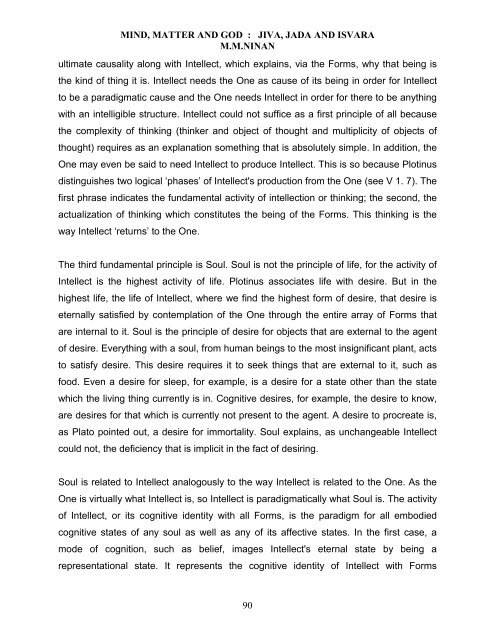Jiva
You also want an ePaper? Increase the reach of your titles
YUMPU automatically turns print PDFs into web optimized ePapers that Google loves.
MIND, MATTER AND GOD : JIVA, JADA AND ISVARA<br />
M.M.NINAN<br />
ultimate causality along with Intellect, which explains, via the Forms, why that being is<br />
the kind of thing it is. Intellect needs the One as cause of its being in order for Intellect<br />
to be a paradigmatic cause and the One needs Intellect in order for there to be anything<br />
with an intelligible structure. Intellect could not suffice as a first principle of all because<br />
the complexity of thinking (thinker and object of thought and multiplicity of objects of<br />
thought) requires as an explanation something that is absolutely simple. In addition, the<br />
One may even be said to need Intellect to produce Intellect. This is so because Plotinus<br />
distinguishes two logical ‘phases’ of Intellect's production from the One (see V 1. 7). The<br />
first phrase indicates the fundamental activity of intellection or thinking; the second, the<br />
actualization of thinking which constitutes the being of the Forms. This thinking is the<br />
way Intellect ‘returns’ to the One.<br />
The third fundamental principle is Soul. Soul is not the principle of life, for the activity of<br />
Intellect is the highest activity of life. Plotinus associates life with desire. But in the<br />
highest life, the life of Intellect, where we find the highest form of desire, that desire is<br />
eternally satisfied by contemplation of the One through the entire array of Forms that<br />
are internal to it. Soul is the principle of desire for objects that are external to the agent<br />
of desire. Everything with a soul, from human beings to the most insignificant plant, acts<br />
to satisfy desire. This desire requires it to seek things that are external to it, such as<br />
food. Even a desire for sleep, for example, is a desire for a state other than the state<br />
which the living thing currently is in. Cognitive desires, for example, the desire to know,<br />
are desires for that which is currently not present to the agent. A desire to procreate is,<br />
as Plato pointed out, a desire for immortality. Soul explains, as unchangeable Intellect<br />
could not, the deficiency that is implicit in the fact of desiring.<br />
Soul is related to Intellect analogously to the way Intellect is related to the One. As the<br />
One is virtually what Intellect is, so Intellect is paradigmatically what Soul is. The activity<br />
of Intellect, or its cognitive identity with all Forms, is the paradigm for all embodied<br />
cognitive states of any soul as well as any of its affective states. In the first case, a<br />
mode of cognition, such as belief, images Intellect's eternal state by being a<br />
representational state. It represents the cognitive identity of Intellect with Forms<br />
90


















